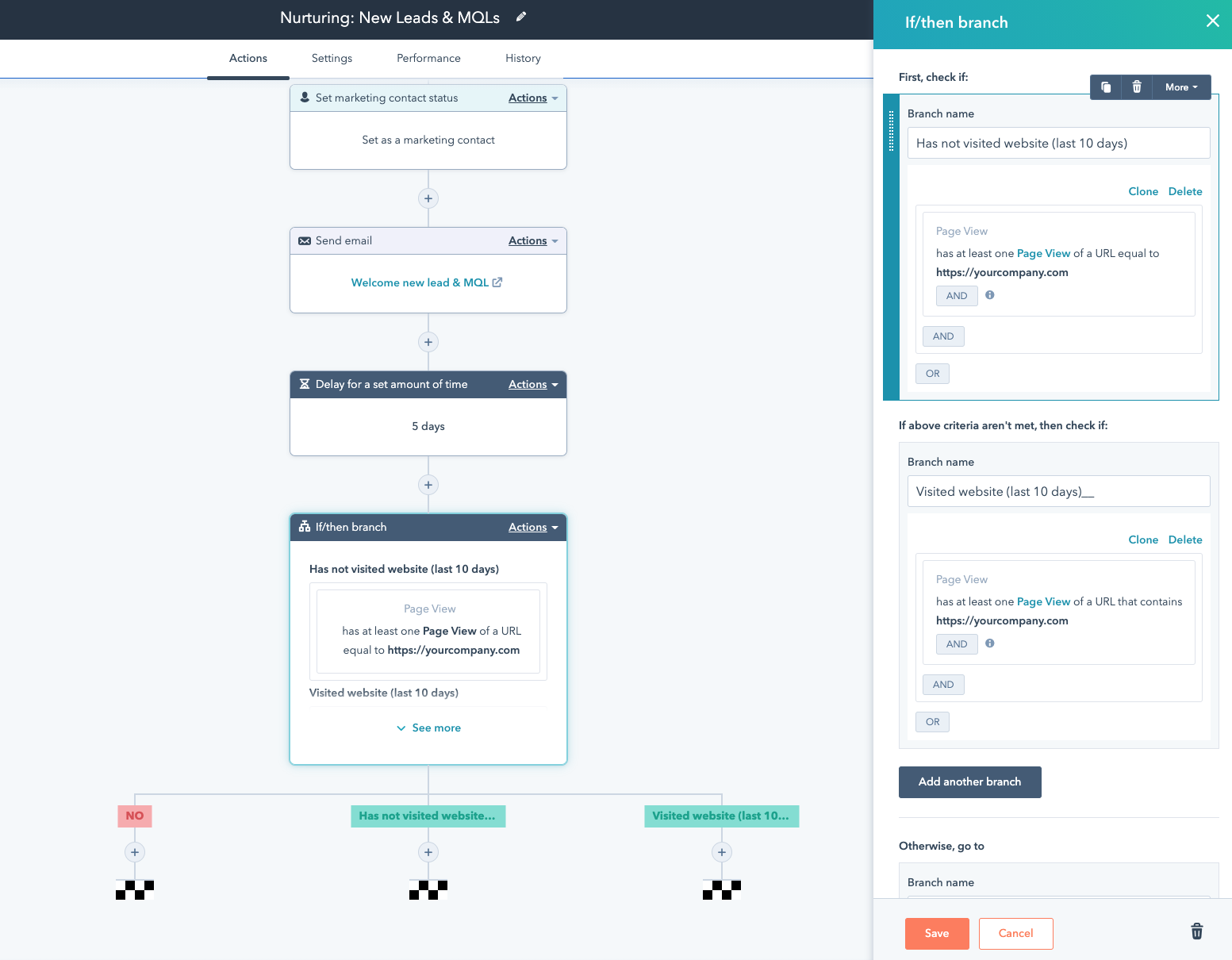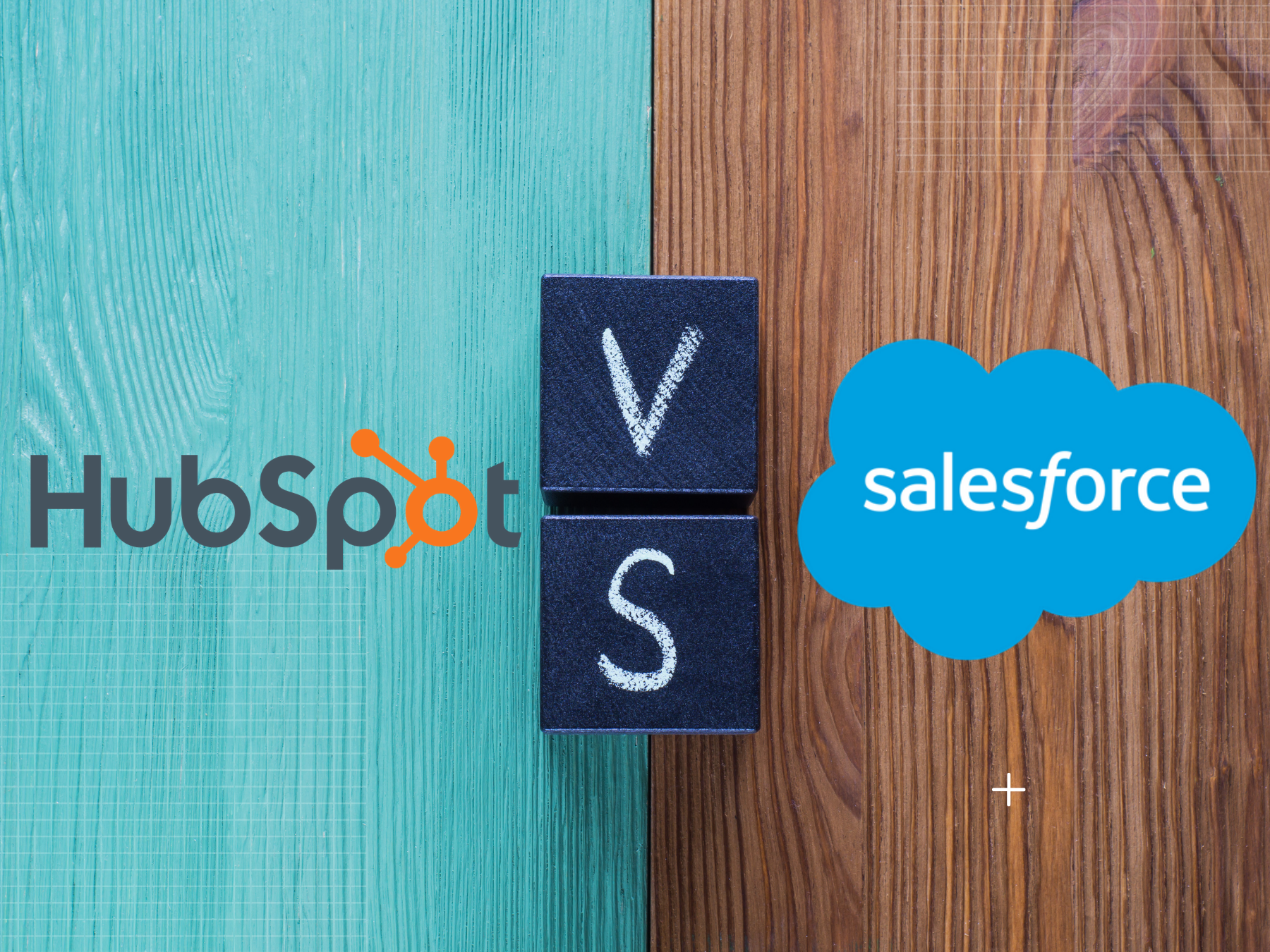Choosing the right CRM is foundational to your business. If we asked you to name one, you'd probably mention Salesforce or HubSpot. While there are many CRM options on the market, these are two of the top-rated CRM platforms in the world.
Both HubSpot and Salesforce provide large sales teams with a robust solution that scales with growth. But since there's usually only room for one of these CRM giants in your business, let's review their USPs in comparison, so you can decide which is the right CRM to grow your business.
Cost
Salesforce charges for every user and requires add-ons for essential features. Whether you're looking to align your sales and marketing teams, provide tailored reporting to board members, or letting your reps operate in a shared inbox, you could incur extra costs. And if you're in need of extra support, there are additional costs included.
HubSpot's pricing grows with your business. It's total cost of ownership amounts to a fraction of Salesforce's cost over time. It's pricing model is by far more transparent and scalable for businesses that are growing. The price includes phone support and free seats are available for team members who need visibility into the business - it's the perfect platform to grow your organisation at an affordable price.
You can see a clearer difference in costs below, according to HubSpot's website:
| HubSpot Sales Hub Enterprise Pricing | Salesforce Sales Cloud Enterprise Pricing | |
| List Price | $6,000/mo for 50 paid users | $7,500/mo for 50 users |
| Licensing Costs | Pay $120/mo for each additional paid user | Pay $25 - $150 per additional user depending on package |
| Implementation | Flat rate of $3,000 for Enterprise onboarding. Additional technical consulting services available for additional fees |
Salesforce offers a ‘Jump-Start’ implementation for $5,000 |
| Platform Maintenance | Enjoy a seamless platform built on one code base | Set-up and maintain connectors for multi-cloud integrations 20 work hours to configure, with regular updates |
| Customer Support Costs | Phone and email support included for all Professional and Enterprise plans | 20% of net-cost for phone support and 24/7 coverage 30% of net-cost for additional feature access (Add 5% for U.S. based support) |
| Outbound Calling Software |
Included in all plans. Calling limits apply (2,000 minutes per user/mo for Enterprise); not available in all countries |
Calling and Logging $45/user/mo (for 1,000 minutes) |
| Sales Engagement Software | Included with Enterprise:
|
Inbox $25/user/mo More add-ons |
| ESTIMATED TOTAL COST P.A | $75,000 | $170,400 |
Feature sets: What can it do?
Salesforce deserves it's reputation as a complex CRM for enterprise-level businesses. With regards to functionality, it offers more customization than HubSpot. However, if you want complete flexibility, you'll likely need Salesforce experts to guide you on implementing custom functionality.
HubSpot is uniquely dedicated to ease-of-use and simplicity for admins, reps and managers. It's cheaper to use across the board, and is intuitive out of the box. HubSpot can be administered in-house without third party developers or consultants. You also have all the essential tools for accelerating and automating repetitive tasks: email templates, automated outreach sequences, automated meeting scheduling, engagement tracking, and a dependable mobile app.
| HubSpot | Salesforce | |
| Control & Flexibility |
|
|
| Power & Functionality |
|
|
| Ease of Use & Adoption |
|
|
| All-in-one Platform |
|
|
| Scale & Customization |
|
|
| Ecosystem |
|
|
| Support |
|
|
Collaboration/eliminating silos between teams
For sales teams, friction is the ultimate foe. Both HubSpot and Salesforce have great functionality for marketing and sales, and you can mix and match as needed,
HubSpot's sales, marketing and service suites were all built in-house with the user experience in mind. So you'll find that all of the individual tools are able to work harmoniously with each other.
Salesforce has endless tools you can add to your CRM too, however their breadth can come at the cost of usability and maintenance. As their platform has grown through Pardot, this can create a less integrated user experience.
At ProsperoHub, we don't segment our teams as marketing and sales. Because of HubSpot's ability to combine both sales and marketing activities to work as one process, we operate as one revenue generation team. HubSpot's Sales Hub eliminates friction by bringing all your tools and data together on one easy-to-use, powerful platform your whole team will love.
If ease of use is important for your business, for example if you have a team that is less digitally-savvy, HubSpot is a more supportive tool to allow your teams to collaborate, with plenty of free resources to help.
Automation
Letting your tools work for you is so important in today's world. Built-in AI allows your team more capacity to work while key processes continue running in the background, like nurturing contacts in workflows, or setting up automated tasks and notifications for your sales team to follow up with prospects.
Salesforce hosts Einstein, its own built-in AI - with this add-on, you can set up automated processes to take contacts through the buyer's journey - but again, there are costs involved.
HubSpot's automation features include workflows that you can build around any contact, company, deal and ticket values, so whether you want internal or customer-facing automation, you have the freedom to customise as you please. Some automation features depend on the license you have with HubSpot, including predictive lead scoring, recurring revenue tracking and custom event triggers.

Reporting
Salesforce's reporting tools are endlessly customizable, but they take time to implement and require training to master. In today's world, businesses need to be able to adapt quickly, and HubSpot has previously been ranked above Salesforce for ease of setup.
HubSpot's reporting dashboard has undergone some key improvements recently, and the launch of its comprehensive collection of customizable, out-of-the-box reports to easily explore powerful insights, including deal change history, sales activities, revenue attribution and sales outcomes has really pushed the boat forward in terms of its capabilities. Combined with HubSpot's ease of use, it's difficult to compete with.
Making the switch - Salesforce to HubSpot
Can't make your mind up? HubSpot does also have a HubSpot and Salesforce integration - with HubSpot’s fast, reliable, and powerful integration with Salesforce, syncing your data can be done in minutes – no technical setup required. This makes it possible to use both platforms for your different teams.
However, if there's only room for one CRM at your business, we would highly recommend HubSpot. Yes, we're a bit biased, but if you're going for impact, power and ease of use, HubSpot is at the top of the list. Our dedicated migrations team is here to help you confidently move your marketing and sales team onto HubSpot, with minimal disruption to your business. We don't just copy and paste your old, sub-optimal process. We'll help you design a better system that scales with your business.
Migrating CRMs isn’t easy, so whether you choose to go with HubSpot or Salesforce, aim to choose a system with the simplest integration process, and a CRM you’ll enjoy using for years to come. If you'd like to find out more about how we can help you move to HubSpot, request a consultation below.



.png?width=1940&height=1024&name=Part%20of%20Siloy%20logos%20(2).png)



.png?width=125&height=125&name=DataMigration534x534%20(1).png)
-1.png?width=125&height=125&name=Untitled%20design%20(4)-1.png)
